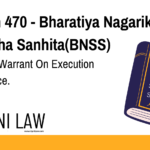Code
(1) When any person other than a person accused of a non-bailable offence is
arrested or detained without warrant by an officer in charge of a police station, or appears or is brought before a Court, and is prepared at any time while in the custody of such officer
or at any stage of the proceeding before such Court to give bail, such person shall be
released on bail:
Provided that such officer or Court, if he or it thinks fit, may, and shall, if such person
is indigent and is unable to furnish surety, instead of taking bail bond from such person,
discharge him on his executing a bond for his appearance as hereinafter provided.
Explanation.—Where a person is unable to give bail bond within a week of the date
of his arrest, it shall be a sufficient ground for the officer or the Court to presume that he is
an indigent person for the purposes of this proviso:
Provided further that nothing in this section shall be deemed to affect the provisions
of sub-section (3) of section 135 or section 492.
(2) Notwithstanding anything in sub-section (1), where a person has failed to comply
with the conditions of the bond or bail bond as regards the time and place of attendance, the
Court may refuse to release him on bail, when on a subsequent occasion in the same case he
appears before the Court or is brought in custody and any such refusal shall be without
prejudice to the powers of the Court to call upon any person bound by such bond or bail
bond to pay the penalty thereof under section 491.
2. Explanation of Section 478 BNSS
Key Provisions:
- Bailable Offences: If a person is accused of a bailable offence, he has a right to be released on bail.
- Indigent Persons: If a person is too poor to furnish surety and is unable to provide a bail bond within seven days, he may be released on a personal bond.
- Exceptions: This provision does not override Sections 135(3) and 492 BNSS.
- Bail Revocation: If a person violates bail conditions, the Court may refuse bail in the future and may impose penalties.
3. Illustration: Example of Application
Example 1: Bail for a Bailable Offence
Rahul is arrested for a bailable offence (e.g., theft under a certain value). He appears in Court and is willing to provide bail. The Court releases him on bail immediately.
Example 2: Indigent Person Released on Bond
Sohan, a laborer, is arrested for a minor offence but cannot afford a surety. Since he fails to furnish a bail bond within a week, the Court presumes he is indigent and releases him on a personal bond.
Example 3: Bail Refused for Violating Conditions
Arjun, out on bail, misses multiple court hearings despite clear instructions. When arrested again in the same case, the Court refuses bail under Section 478(2) BNSS.
4. Common Questions and Answers
Q1: Is bail a right under this section?
Yes, for bailable offences, bail is a right unless conditions under Section 478(2) are violated.
Q2: What happens if an accused fails to provide bail within a week?
If the accused is indigent, the Court may release him on a personal bond without a surety.
Q3: Can bail be denied in any situation under this section?
Yes, if the accused has previously violated bail conditions, the Court can refuse bail on a subsequent occasion in the same case.
Q4: Does this section apply to non-bailable offences?
No, this section applies only to bailable offences.
5. Conclusion
Section 478 BNSS defines the conditions under which an accused can be granted bail. It ensures that individuals accused of bailable offences are released promptly while protecting the rights of indigent persons who cannot furnish surety. At the same time, it imposes strict conditions on those who fail to comply with bail terms, preventing misuse of the provision. This section balances individual liberty with judicial oversight, ensuring a fair legal process.








